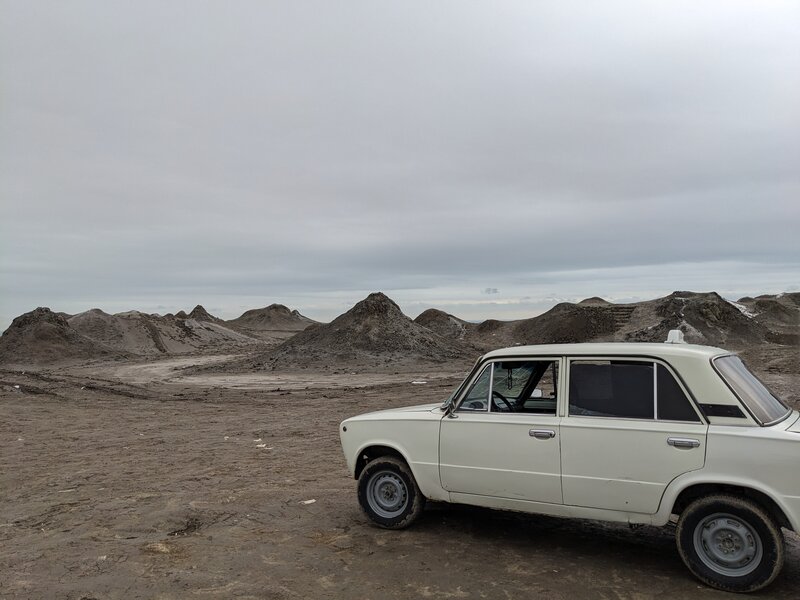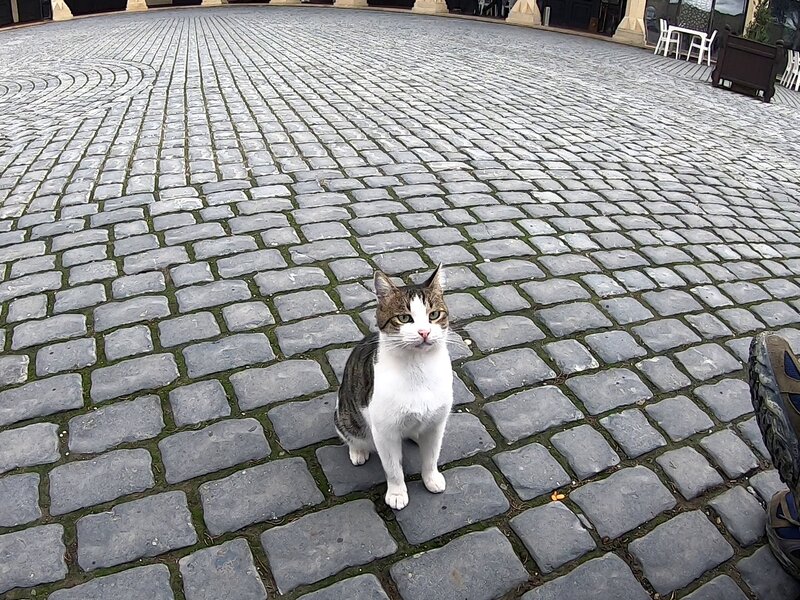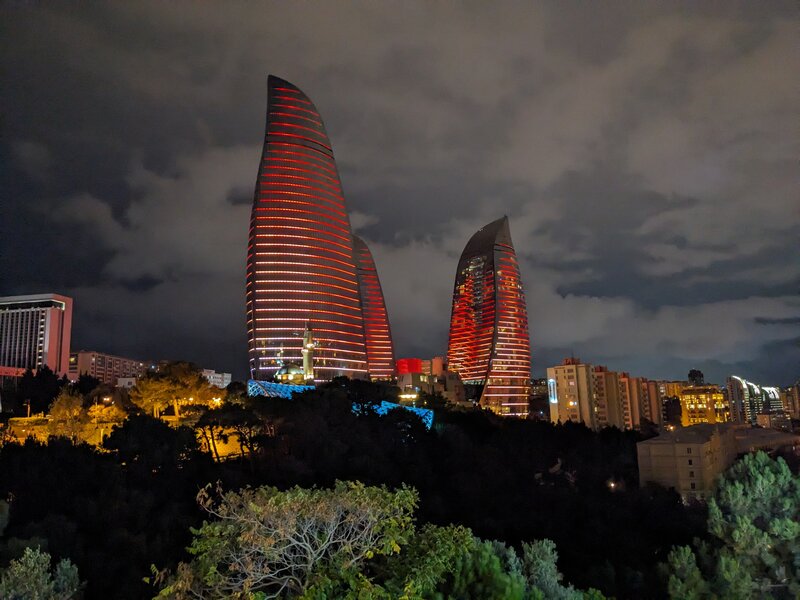I had barely slept as I was busy planning the routes toward Istanbul and beyond, but a cloudy autumn morning inevitably arrived. Since the upcoming excursion was going to cover a lot of ground, Gunn and I headed out of the hostel for an early start just as dawn was breaking. We walked over to the fancy central district where the streets stretched for miles, lined with impressive tiles and century-old buildings. It felt a little strange to leave the backpack at the hostel. Usually, by this point, I was always ready to move on to a different city–I had never stayed in the same city for two consecutive days. It was rather relieving to have another entire day ahead of me and a place to which I could come back at the end of the day.
While we were waiting for the van to depart, Gunn and I found ourselves discussing what inspired us to travel. It was a natural subject for two fellow countrymen so far away from home. I struggled to explain myself, and the words fell short whenever I tried to articulate why exactly I was there. But Gunn had a practical answer of his own. “I left my job to travel for a while,” he said, “because money can be earned when I am older, but youth cannot be bought.” That answer left me thinking, because it was the same conclusion I had reached in the past and had driven me to travel more often. But circumstances had changed. I was now a sellout software engineer reminiscing about those simpler times when I could travel freely. Feeling regretful about having traded away my freedom and ideals, I began babbling, “Yes, I thought about it too, and maybe that is the right answer.” “Well,” Gunn calmly said, “there isn’t really a right or wrong answer. I’m saying, for me, it’s just so.” It was a wise answer to a silly remark.
We were all free to approach this trade-off between freedom and riches in our own ways. Those choices never come easily for anyone, and I too found it difficult to make peace with them. On that Urumqi-bound train, when I decided to stop approaching life with a mindset of making compromises, maybe I was trying to stage a rebellion against the circumstances that cornered me into making the difficult choices between freedom and material wealth. This trip to Dublin was probably the last flicker of my will, a fit of disobedience against the growing reach of reality that pulled me into conformity. I didn’t want to fall in line, but the line always found me. I didn’t want to be ordinary, but my imagination had been bent to the will of the tiny world that surrounded me. I began to see, at least vaguely, why I was really chasing this imaginary road toward Dublin. I was trying to stay afloat while refusing to make the choices that life forced on me. My revolt would come to an end once I eventually eased into the rhythm of life in Seattle. When I was sipping an expensive cup of coffee in the comfort of my newly adopted home, would I remember these struggles, and would I have discovered their meanings? I hoped that I would have the courage to stay out of line and the smarts to figure out the point of it all.
The van arrived at a mosque located outside downtown Baku. Although it had a great view of Baku and interesting architecture, I just couldn’t find the enthusiasm for yet another mosque, having already been to dozens of them in Central Asia. Gunn and I were amused to realize that we were both thinking the same thing. “Many travelers who make their way from the east,” Gunn jested, “are generally tired of seeing mosques at this point.” Our Azerbaijani guide, Sahil, passionately explained the architecture and relics that surrounded us, but his words kind of fell on deaf ears. To escape the boredom, I tried to converse with Sahil in my broken Russian when I noticed that he alternated his explanations between English and Russian. Sahil was pretty entertained by my attempt. He explained that people generally knew the language because it was used in schools, and he could speak it natively. He had a pretty interesting story. His parents were originally from Turkmenistan, but moved to Azerbaijan during the Soviet era to work in the burgeoning oil industry as engineers. The oil fields were still booming just outside the city’s doorstep. We drove past fields full of machinery extracting oil from the barren surface. Their slow, undulating motion seemed particularly lifeless in a landscape that was taking on a more desolate atmosphere as we drove further into the outskirts.
We passed the growing expanses of abandoned lots and empty fields to arrive at the mud volcano, which was as underwhelming as the mosque. On the top of the mountain, there were some tiny mud-filled geysers that occasionally and tediously let out little blobs of gas. What was more interesting than the volcano itself was the trip to the top of the hill because we got to ride in a real Zhiguli. The banged up Zhiguli, a Soviet-manufactured car, had some similar qualities to what I had seen in Hotel Uzbekistan in Tashkent. If you took away even a small thing, the car would cease to be what it was. It was almost too simple and honest, which made it perfect in its own way–unlike other forms of perfection that irked me. The mighty Zhiguli patiently climbed the muddy and unpaved path to the top of the windy mountain. Noticing my unusual fascination with the Soviet car, Sahil asked the driver something in Azerbaijani and told me that this particular car was from the last generation of Zhiguli. Maybe that meant that it wasn’t actually Soviet-made. But sitting under the gray sky dulled by the clouds, the run-down, lonely Zhiguli covered in mud breathed a somber air hinting at a melancholy past that refused to fade away.

All the other places we visited turned out to be equally lackluster, and Gunn jokingly apologized for having dragged me into the tour. I just said, tongue-in-cheek, “If you look on the bright side, we are visiting all these places in one day.” We couldn’t help but chuckle at the pointless proposition. We were the mighty tourist-inspectors, conveniently being chauffeured around to conduct cursory examination of places, taking pictures and mechanically ticking off the locations in a list not of our own.
Although the gray sky didn’t give it away immediately, the afternoon was fading away as rapidly as the arid landscape disappeared behind the van window. So Gunn and I started talking about what we were going to do the following day, leaving Baku. Gunn was most likely leaving for Sheki, and I was going to Aghstafa to try to cross into Georgia. Hearing that I was still set on making my way to Dublin in the next ten days, Gunn again offered some reality checks. “I think it’s still not doable,” he said with a genuine tone, “even if you pulled it off, you’d be on the road the whole time.” “Yeah, I’m just hoping that it all works out.” “Maybe you had better go to Sheki,” Gunn said, “I mean, why do you need to go to Dublin anyway?” This time, the words that had escaped me somehow came easily: “I wanted to walk on that road to the end.” For the first time, uttering these words, I arrived at one possible explanation about why I was headed to Dublin. We may call that reason a revolt, defiance, or dress it up in any philosophical notion, but it came down to a simple fact that there was a road and I wanted to be on it. The path, for all its uncertainty, was obvious in a way that made it impossible for me not to follow it. As if he understood, Gunn just said “I see, so you find meaning in being on that road itself.” He still recommended that I extend my schedule a little bit. And I unloaded my whole story about how I was actually moving to Seattle and needed to get there on time for work. “Then these must be precious times,” was Gunn’s response after contemplating the absurdity of the premise and the conviction with which I still spoke of it.
The uninspiring tour of Baku’s finest destinations was almost coming to an end, and Sahil led the group into a fancy restaurant for a late lunch. As thrifty backpackers, Gunn and I chose not to participate in that extravagant ritual. In response to our decision, Sahil callously said, “Up to you guys, but you cannot come in unless you are paying.” Normally it would have been no problem, but we were up on some mountain where the city of winds was revealing its merciless side. Fierce wind mixed with a hint of raindrops barraged us from every direction. With no places to go, we sat down on a bench nearby and shared pieces of bread that we had each brought. Somehow we saw a humor in the situation and laughed as we tried unsuccessfully to resist the cold wind. “Well, at least we didn’t give in to the system. That’s a win in my book,” we bantered, but our restrained laughter was muffled by the unceasing roar of the wind and shivers. A stray cat, our only companion, wandered over and glared at the bread intently.

When we were dropped back off in downtown Baku, the sun was retiring from the cloudy sky, having had no chance to show its face all day. Buildings and street lamps were lighting up one by one as dusk fell. Finally relieved from the duties of tourist-inspectors, we walked around the downtown to get some dinner. By this time, I was gradually realizing that everything was more expensive than it had been in Central Asia. After all, it wasn’t just the architecture, people, or the climate that changed across the sea. In an attempt to be economical, we bought some small kebabs and some more bread, but they ended up costing as much as a meal at a restaurant.
The night was deepening but there was still one thing left to do. On my first day in Baku, I couldn’t walk all the way to the flame towers that were visible on top of the hill because I was too exhausted. Since this was the last night in Baku, I figured it would be a great idea to head there and check out what Baku looked like at night. Gunn had already been there but came along for the view. The towers weren’t as far as they appeared, but the tram to the top of the hill had already been closed for the night. We climbed the stairs for about ten minutes, doubting at every step of the way whether the effort was even worthwhile. When we arrived at the top of the hill, the relentless wind from the Caspian Sea roared from everywhere. The city of winds was unleashing its fury one last time before I left.
In the distance, the towers were ablaze, their flames getting only more intense as the unforgiving wind pummeled them from all directions. On the other side of the flame, the brightly lit bay of Baku swept the coastline in a curve, merging with the dark water of the Caspian Sea. The sea wasn’t even visible anymore and appeared simply as a dark mass. The only thing that hinted at its existence was the glittering lights on the shoreline that separated the city from the unfathomable body of water. The motionless dark sea just sat there in bleak silence, not handing out any promises about the future or revealing what lay beyond its darkened horizon. Regardless, the flame raged intensely against the dreary silence of the dark sea.

Leaving the unbearable calm of the sea and the roar of the salt-laden wind behind, we climbed down the hill and headed back. “Is it fun to travel?” I asked out of nowhere. “Yes,” was Gunn’s response. And he quickly added, “but sometimes I have doubts, like what I’m even doing way out here.” It seemed like we were all dealing with our share of self-doubt regardless of our circumstances. I remembered my own doubts about being on this road and realized that they had been coming into my mind less often, at least since I crossed Irkeshtam a week before. I must have come to terms with uncertainty ever since I chose to walk toward the flickering lights at Irkeshtam. Or maybe I had been too busy planning my routes to worry about anything else. Whatever the case, I hoped that as I carried on with the rest of the trip and with life at large, I could continue to resist doubts and take steps toward the unknown lights at the risk of failure. And I hoped that my fellow traveler, too, would overcome his doubts and reach the Christmas market as he planned. “Maybe trying to get to our destinations is worthwhile,” I said to him. But maybe I said that really to myself.
My train to Aghstafa was leaving at 9:00AM the following day. But I couldn’t go to bed because I had run out of clean clothes long ago and needed to do laundry. The last time I had done laundry was in Kashgar before heading out to the Uyghur wedding with the friends. I had a feeling that tonight was probably my last chance at laundry, because I would be scrambling full steam toward Istanbul and Dublin. Since the one washing machine in the hostel was occupied for hours, I passed the time at the corner table while coming up with game plans for the days ahead. Gunn was busy somewhere else working on his own projects and later came over. He said that he was all set to leave for Sheki in the morning. Upon learning that I still hadn’t changed my mind about reaching Dublin, Gunn didn’t try to remind me of the absurdity of the plan this time. He simply smiled and suggested, “I dare say you’re the oddest traveler I have met.” The endless hum of the washing machine filled the quiet of the night. The machine kept turning fast and slow, indifferent to all my worries–whether my clothes would be dry by morning, or whether I could reach Georgia tomorrow as planned. All my worries were gradually drowned out by the mechanical whir, as my fatigued mind spun into a moment of peaceful silence. Maybe the world needs a couple of oddballs. Otherwise it would be a bit boring and too ordinary.